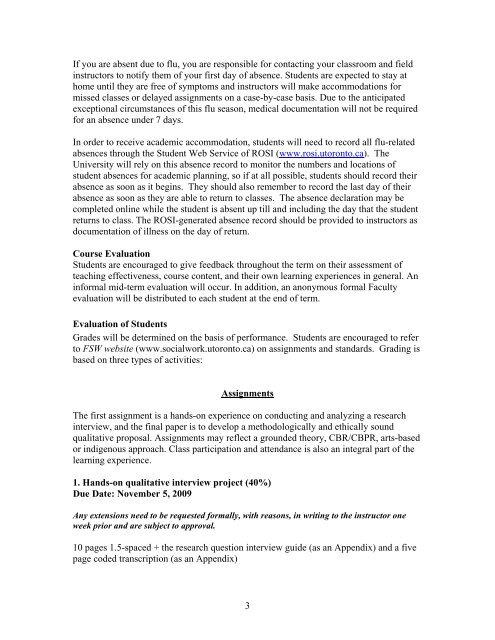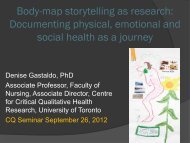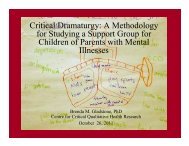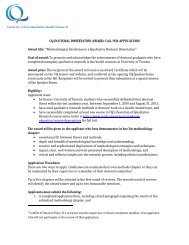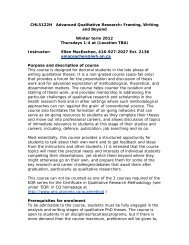Doctor of Ministry Program - Centre for Critical Qualitative Health ...
Doctor of Ministry Program - Centre for Critical Qualitative Health ...
Doctor of Ministry Program - Centre for Critical Qualitative Health ...
You also want an ePaper? Increase the reach of your titles
YUMPU automatically turns print PDFs into web optimized ePapers that Google loves.
If you are absent due to flu, you are responsible <strong>for</strong> contacting your classroom and field<br />
instructors to notify them <strong>of</strong> your first day <strong>of</strong> absence. Students are expected to stay at<br />
home until they are free <strong>of</strong> symptoms and instructors will make accommodations <strong>for</strong><br />
missed classes or delayed assignments on a case-by-case basis. Due to the anticipated<br />
exceptional circumstances <strong>of</strong> this flu season, medical documentation will not be required<br />
<strong>for</strong> an absence under 7 days.<br />
In order to receive academic accommodation, students will need to record all flu-related<br />
absences through the Student Web Service <strong>of</strong> ROSI (www.rosi.utoronto.ca). The<br />
University will rely on this absence record to monitor the numbers and locations <strong>of</strong><br />
student absences <strong>for</strong> academic planning, so if at all possible, students should record their<br />
absence as soon as it begins. They should also remember to record the last day <strong>of</strong> their<br />
absence as soon as they are able to return to classes. The absence declaration may be<br />
completed online while the student is absent up till and including the day that the student<br />
returns to class. The ROSI-generated absence record should be provided to instructors as<br />
documentation <strong>of</strong> illness on the day <strong>of</strong> return.<br />
Course Evaluation<br />
Students are encouraged to give feedback throughout the term on their assessment <strong>of</strong><br />
teaching effectiveness, course content, and their own learning experiences in general. An<br />
in<strong>for</strong>mal mid-term evaluation will occur. In addition, an anonymous <strong>for</strong>mal Faculty<br />
evaluation will be distributed to each student at the end <strong>of</strong> term.<br />
Evaluation <strong>of</strong> Students<br />
Grades will be determined on the basis <strong>of</strong> per<strong>for</strong>mance. Students are encouraged to refer<br />
to FSW website (www.socialwork.utoronto.ca) on assignments and standards. Grading is<br />
based on three types <strong>of</strong> activities:<br />
Assignments<br />
The first assignment is a hands-on experience on conducting and analyzing a research<br />
interview, and the final paper is to develop a methodologically and ethically sound<br />
qualitative proposal. Assignments may reflect a grounded theory, CBR/CBPR, arts-based<br />
or indigenous approach. Class participation and attendance is also an integral part <strong>of</strong> the<br />
learning experience.<br />
1. Hands-on qualitative interview project (40%)<br />
Due Date: November 5, 2009<br />
Any extensions need to be requested <strong>for</strong>mally, with reasons, in writing to the instructor one<br />
week prior and are subject to approval.<br />
10 pages 1.5-spaced + the research question interview guide (as an Appendix) and a five<br />
page coded transcription (as an Appendix)<br />
3


